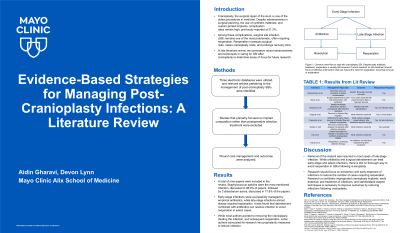Evidence-Based Practice
(EBP-007) Evidence-based Strategies for Managing Post-cranioplasty Infections: A Literature Review
Friday, May 2, 2025
7:45 PM - 8:45 PM East Coast USA Time

Devon Lynn, B.S.
Introduction: Cranioplasty, the surgical repair of the skull, is one of the oldest procedures in medicine. Despite advancements in surgical planning, the use of synthetic materials, and custom-printed implants, complication rates remain high, previously reported at 31.3%. Among these complications, surgical site infection (SSI) remains one of the most problematic, often requiring reoperation. Reoperation increases surgical risks, raises cranioplasty costs, and prolongs recovery time. In this literature review, we summarize recent advancements and techniques in caring for SSI after cranioplasty to determine areas of focus for future research.
Methods: Three electronic databases were utilized, and relevant articles pertaining to the management of post-cranioplasty SSIs were identified. Two independent screeners screened abstracts, full-length papers, and extracted relevant information. Studies were excluded if the primary focus was implant composition (e.g. comparing autologous bone versus polyetheretherketone), or if they did not outline the steps to treat postoperative infection.
Results: A total of nine papers were included in the review. Staphylococcus species were the most mentioned infection, discussed in 88.9% of papers, followed by Cutibacterium acnes, discussed in 77.8% of the papers. Early-stage infections were successfully managed by empirical antibiotics, while late-stage infections almost always required explantation. It was found that debridement combined with antibiotics can resolve infection to avoid reoperation in select cases. While most authors pointed to removing the cranioplasty, treating the infection, and subsequent reoperation, some authors advocated for research into prophylactic measures to reduce infection.
Discussion: Despite the variety of techniques to treat postoperative infections, removal of the implant was required in most cases of late-stage infection. While antibiotics and surgical debridement can treat early-stage and select infections, there is still no thorough way to avoid reoperation in SSIs following cranioplasty. Overall, research should focus on prevention and early treatment of infections to reduce the number of cases requiring reoperation. Research on antibiotic-impregnated cranioplasty implants, early detection and treatment of infections, and standardized aseptic techniques is necessary to improve outcomes by reducing infections following cranioplasty.
Methods: Three electronic databases were utilized, and relevant articles pertaining to the management of post-cranioplasty SSIs were identified. Two independent screeners screened abstracts, full-length papers, and extracted relevant information. Studies were excluded if the primary focus was implant composition (e.g. comparing autologous bone versus polyetheretherketone), or if they did not outline the steps to treat postoperative infection.
Results: A total of nine papers were included in the review. Staphylococcus species were the most mentioned infection, discussed in 88.9% of papers, followed by Cutibacterium acnes, discussed in 77.8% of the papers. Early-stage infections were successfully managed by empirical antibiotics, while late-stage infections almost always required explantation. It was found that debridement combined with antibiotics can resolve infection to avoid reoperation in select cases. While most authors pointed to removing the cranioplasty, treating the infection, and subsequent reoperation, some authors advocated for research into prophylactic measures to reduce infection.
Discussion: Despite the variety of techniques to treat postoperative infections, removal of the implant was required in most cases of late-stage infection. While antibiotics and surgical debridement can treat early-stage and select infections, there is still no thorough way to avoid reoperation in SSIs following cranioplasty. Overall, research should focus on prevention and early treatment of infections to reduce the number of cases requiring reoperation. Research on antibiotic-impregnated cranioplasty implants, early detection and treatment of infections, and standardized aseptic techniques is necessary to improve outcomes by reducing infections following cranioplasty.

.jpg)